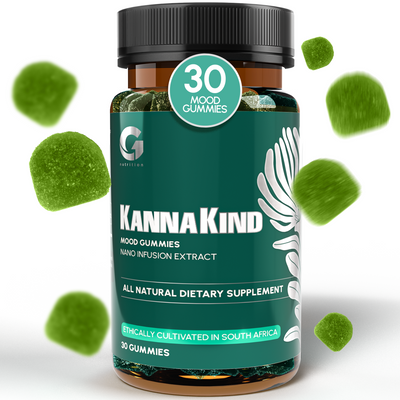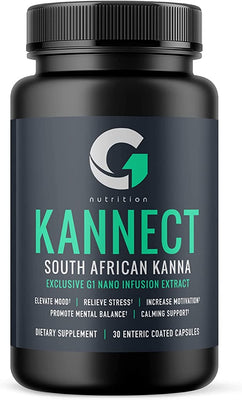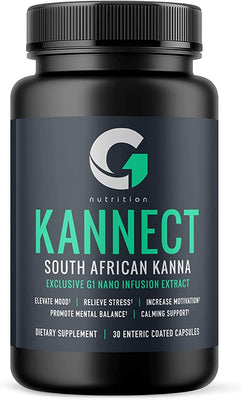Introduction
The world of botanical ingredients is vast and full of fascinating plants that have supported human wellness for centuries. One such plant gaining attention in modern dietary supplements is Kanna, also known by its scientific name, Sceletium tortuosum. As its popularity grows, so do the questions about its use, benefits, and, most importantly, its safety.
Kanna has moved from its traditional roots in South Africa into the global spotlight, featured in supplements designed to support mood and mental well-being. This article serves as a clear guide to understanding Kanna. We will explore its historical uses, its modern applications, and take a balanced look at its safety profile. We'll also discuss the regulatory landscape in the United Kingdom, so you can make informed and confident choices about your health.
Traditional and Modern Uses of Kanna
To understand Kanna's place in supplements today, we first need to look back at its origins. The plant's journey from a regional botanical to a global supplement ingredient is a story of tradition meeting modern science.
Ethnobotanical and Historical Use
For hundreds, if not thousands, of years, Kanna has been an integral part of the culture of indigenous peoples in South Africa, particularly the San and Khoikhoi communities. These hunter-gatherers and pastoralists knew the local flora intimately and used Sceletium tortuosum for social and spiritual purposes.
Traditionally, the plant material—often the leaves, stems, and roots—was fermented and then chewed or smoked. It was used to help ease thirst and hunger, reduce stress, and elevate mood during long journeys or community gatherings. Its value was in promoting a sense of connection and well-being, not for intense psychoactive effects. This long history provides a rich context for its modern applications and initial safety observations.
Contemporary Supplement Applications
Today, Kanna is available in convenient, modern forms like capsules and gummies. The focus has shifted from its traditional preparations to standardized extracts that deliver a consistent profile of the plant's active compounds, known as alkaloids.
In the contemporary supplement market, Kanna is primarily used by individuals looking for natural ways to support their mental and emotional health. Common applications include:
-
Stress Support: Many people turn to Kanna to help manage the pressures of daily life. It is believed to support a calm and relaxed state of mind.
-
Mood Support: Kanna is widely associated with promoting a positive mood and an overall sense of well-being. Users often report feeling more content and cheerful.
-
Cognitive and Energy Support: Some individuals use Kanna to enhance their focus, mental clarity, and energy levels without the jittery feeling associated with stimulants. It can help provide a smooth, centered feeling of alertness.
These modern uses are rooted in Kanna's traditional reputation as a mood-lifting botanical, now delivered through carefully formulated dietary supplements.
Safety Profile of Kanna
Whenever you consider a new supplement, safety is the top priority. Understanding what the science says, what we know from human use, and where more research is needed is crucial. Kanna has been the subject of growing scientific interest, giving us a clearer picture of its safety profile.
Preclinical Safety Evidence
Before any ingredient is widely used in humans, scientists conduct preclinical studies. These involve laboratory tests (in vitro) and animal studies to predict how it might affect the human body. Research on Sceletium tortuosum extracts has generally shown a favorable safety profile in these settings.
Animal studies have helped determine tolerable intake levels and have looked for signs of toxicity at very high doses. The results from these studies have largely been reassuring, indicating that Kanna does not cause harm to organs or bodily systems when used at appropriate levels. These findings are an important first step, but they pave the way for what matters most: human data.
Human Safety Data
Human studies and widespread consumer use provide the most relevant information on safety. In clinical trials investigating Kanna's effects on mood and cognition, it has generally been well-tolerated by participants.
The most commonly reported side effects are mild and tend to be temporary. They can include:
-
Headaches
-
Mild nausea or digestive upset
-
Drowsiness
These effects are not common and often resolve as the body adjusts or if the dose is lowered. Importantly, formal adverse event reporting systems have not flagged Kanna as a significant safety concern when used as directed. The vast majority of users experience its benefits without any unwanted effects. However, it's vital to respect the plant and use it responsibly.
Known Unknowns
While current data is positive, it's also important to acknowledge what we don't yet know. The world of herbal science is always evolving, and there are areas where more research on Kanna would be beneficial.
-
Long-Term Use: Most clinical studies on Kanna are short-term, typically lasting a few weeks to a few months. While its long history of traditional use suggests a good long-term safety profile, more formal, long-duration clinical trials would strengthen this understanding.
-
High-Dose Studies: The safety of Kanna is well-established at recommended doses. Research on the effects of very high doses is limited, which is another reason why it's essential to follow the dosage instructions provided by manufacturers.
-
Specific Populations: More research is needed on Kanna's effects in specific groups, such as pregnant or breastfeeding women and individuals with pre-existing medical conditions. As a general precaution, these groups should avoid using Kanna supplements unless advised by a healthcare professional.
Featured Products
Risks of Adulteration and Misuse
While pure, high-quality Kanna is considered safe for most people, risks can arise from poor manufacturing practices or improper use. Choosing a reputable brand and following usage guidelines are the two most important things you can do to ensure a safe and positive experience.
Potential for Contamination or Substandard Extracts
Not all supplements are created equal. The quality of a Kanna product depends entirely on the manufacturer's commitment to excellence. Low-quality products may pose several risks:
-
Inconsistent Alkaloid Profile: The benefits of Kanna come from its specific mix of alkaloids. A substandard extract may not have the right balance, making it ineffective or unpredictable.
-
Contamination: Poor sourcing and manufacturing can lead to contamination with heavy metals, pesticides, or microbes. Reputable manufacturers test for these contaminants to ensure their products are pure.
-
Mislabeling: Some products might contain less Kanna than stated on the label, or worse, none at all. This is a form of supplement adulteration that cheats the consumer.
Consumer Tip: Always buy from transparent brands that provide information about their sourcing, manufacturing standards, and testing procedures. Look for companies that use third-party labs to verify the purity and potency of their products.
Misuse and Excessive Dosing
More is not always better. Taking a higher dose of Kanna than recommended will not necessarily increase the benefits and may raise the risk of side effects. It's designed to be a gentle support for your system, not an overwhelming force.
A significant safety consideration is Kanna's interaction with other substances. Kanna works on serotonergic pathways in the brain, which are related to mood. Many prescription antidepressants, such as SSRIs (Selective Serotonin Reuptake Inhibitors) and MAOIs (Monoamine Oxidase Inhibitors), also target this system.
CRITICAL SAFETY WARNING: Combining Kanna with SSRIs, MAOIs, or other serotonergic drugs can be dangerous and may lead to a serious condition called serotonin syndrome. You should NEVER take Kanna if you are on these medications. Always consult with your doctor before starting any new supplement, especially if you take prescription medication.
Regulatory Status and Oversight in the UK
In the United Kingdom, dietary supplements are regulated to ensure they are safe for consumers. The primary body responsible for this oversight is the Office for Product Safety and Standards (OPSS). Understanding this framework can help you choose products that meet UK standards.
OPSS Guidance on Botanical Supplements
The OPSS oversees the general safety of most consumer products, including botanical supplements. Under UK law, supplements must be safe for consumption. This means manufacturers are legally obligated to sell products that do not pose a risk to human health.
This general safety requirement covers everything from the purity of the ingredients to the accuracy of the labeling. While the UK does not have a pre-approval system for most supplements like it does for medicines, the OPSS has the power to take action against unsafe products, including ordering recalls. Herbal supplement safety is a key focus within this framework.
Classification of Kanna in Dietary Supplements
For Kanna, a key regulatory question revolves around whether it is considered a "novel food." A novel food is any food that was not consumed to a significant degree in the UK or EU before May 1997. If an ingredient is deemed novel, it must go through a rigorous pre-market safety assessment.
The status of Sceletium tortuosum can be complex and may depend on the type of extract used. However, its long history of use and the growing body of evidence supporting its safety are important factors. Consumers should look for brands that are navigating this regulatory environment responsibly and are committed to full compliance with UK dietary supplement regulation.
Best Practices for Manufacturers and Retailers
Responsible companies do not just meet the minimum legal requirements; they aim for the highest standards of quality and transparency. Best practices in the industry include:
-
Robust Quality Control: This starts with sourcing authentic Kanna from trusted growers and continues through every step of the manufacturing process.
-
Certificate of Analysis (COA): Reputable manufacturers obtain a COA from a third-party laboratory for every batch of their product. This document verifies that the product is free from contaminants and that the alkaloid content matches the label.
-
Clear Consumer Communications: Brands have a responsibility to provide clear, honest information. This includes accurate dosage instructions, transparent labeling, and prominent safety warnings, such as the crucial caution about interactions with SSRIs and MAOIs.
Manufacturer Tip: Building consumer trust requires a commitment to safety and quality that goes beyond basic compliance. Investing in third-party testing and transparent labeling is essential for long-term success.
Summary and Recommendations
Kanna (Sceletium tortuosum) is a fascinating botanical with a long history of traditional use for mood support and a growing body of modern evidence to back it up. When sourced from high-quality suppliers and used correctly, it offers a safe and effective way to support stress relief, mood, and focus.
For consumers, the key takeaways are:
-
Choose products from reputable, transparent brands that prioritize third-party testing.
-
Always follow the recommended dosage on the product label.
-
Never use Kanna if you are taking SSRIs, MAOIs, or other serotonergic medications.
-
Consult your healthcare provider before starting any new supplement, particularly if you are pregnant, nursing, or have a medical condition.
For manufacturers, the obligation is clear: uphold the highest standards of quality, safety, and transparency. This includes rigorous testing, accurate labeling, and clear consumer education to ensure the responsible use of this remarkable plant. While further research will continue to deepen our understanding, the current evidence shows that Kanna is a valuable and safe addition to the world of dietary supplements when handled with care.



